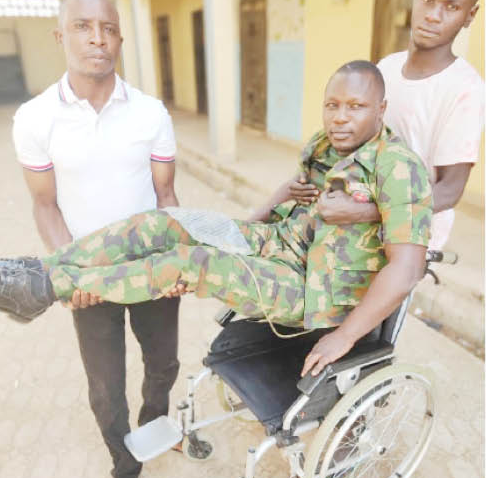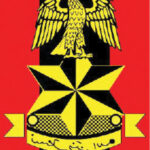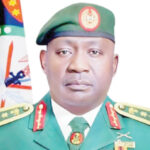An accident in 2015 killed two soldiers and left one of them unable to function normally.
Wheelchair-bound Lance Corporal Abdullahi Mohammed has not just lost his bodily functions but his wife.
- Striking doctors to National Assembly: Ban govt officials from medical tourism
- 4 Winners get Jaiz bank’s N125m COVID-19 fund
His commanding officer had taken him and the other soldiers away from their battalion in Maiduguri, Borno State Capital, where they were fighting insurgents to guard his private residence and work his farm in Kaduna.
Two of them paid with their lives, while he is fighting for his life after his wife divorced him.
As a spritely young man, Abdullahi Mohammed, fancied the army. He had the zeal to serve his fatherland and also to enjoy the reverence soldiers are accorded.
Having lost his father, Alhaji Mai Jaki, a popular politician in Pankshin town of Plateau State during ethnic violence in 2003, and his mother after a brief illness in Mangu, still in Plateau, Abdullahi, was raised by his ageing grandmother.
In 2009, he achieved his dream, joined the army and enjoyed the dignity and prestige he was accorded. .The Lance Corporal revelled in fighting for his country against insurgents in the Northeast and also enjoyed the regular payments.
He got married and had a son and life seemed to be on the upward trajectory for him.
That was until one night in 2015 when he was lucky to survive an accident that claimed the lives of two of his colleagues.

“Shortly after my training at Depot, Nigerian Army, Zaria and the Military Cantonment, Jaji, I was posted to Maiduguri where I was attached to the 212 Battalion,” Abdullahi said.
“We were deployed to different theatres of operations where we were directly involved in an insurgency fight.”
He revelled in defending his country but all that changed in 2014, after returning from a combat operation. He said he was denied the time to rest and was asked by his superiors to move to Kaduna alongside two others to guard the residence of his Commanding Officer (CO), a colonel.
“We were transported to Kaduna with our rifles and stationed at the CO’s house where we met one other soldier, making four of us working as guards. Apart from protecting the family of the colonel, we were forced to perform menial jobs including cleaning and washing sheep. We worked like slaves,” he said.
If working as a slave was a low point, the lowest point would come shortly in that tragic night Abddullahi said he would never forget.
“One day at midnight, the wife of the colonel said her farm along Kaduna-Zaria road was invaded by rustlers and the CO asked us to move to the farm that night with our loaded rifles and drive away the invaders. We knew it was an illegal assignment but we were not given any chance to complain.
“On our way to the farm around 2 am, a speeding trailer crashed into our vehicle and two of my colleagues died on the spot. I was taken to 44 Army Reference Hospital, Kaduna, in a stupor. After waking up from the coma, I realized I could only talk but would not be able to move parts of my body,” he said.
The accident on the Zaria-Kaduna road left the soldier with a spinal cord injury, which caused loss of muscle functions and sensations in his body. He also lost control over his bowels, bladder and sexual functions.
He was later referred to the Ahmadu Bello University Teaching Hospital, Shika, where doctors discovered abnormalities within his spinal cord.
His case remains peculiar in the military. His deployment did not follow proper military protocol and he was injured while on a duty not sanctioned by the military command, but by his Commanding Officer, the military did not feel his treatment was their responsibility.
Though his physical condition has severely interfered with his ability to discharge his duties as a soldier, military authorities have yet to find him unfit for duty and possibly discharge him on medical grounds, even though he has been on a wheelchair for six years.
His situation worsened when the spinal injuries caused bladder dysfunction, which led to problems passing urine. Surgery was conducted on him and an Artificial Urinary Sphincter was inserted in his body to control his urine flow.
For some time after the accident, the soldier and his wife stayed at the residence of his CO while receiving treatment at Shika before finally relocating to his hometown, Mangu, in Plateau State in 2016. There, Abdullahi would receive yet another blow.
“My wife cared for me despite my condition. She helped me a lot but on December 27, 2016, while massaging my legs, she started shedding tears. I asked why she was crying. She said I should not be offended and asked me for a divorce. The following day, I divorced her. Now she is married to another man and has had two children for him,” he said.
While still in Mangu with his relatives, his battalion got a new CO, a lieutenant colonel, who later asked Abdullahi to return to Maiduguri and continue his treatment there.
“The new commander gave me all my allowances and all the care and support I needed. In fact, he frequently visited my apartment to know how I was faring. He paid for all my medical expenses and asked one of my colleagues to also look after me,” he said.
However, when this CO was redeployed and was replaced by a major, the treatment and privilege stopped.
“We had a new commander and unlike before, anytime I am going to the hospital for treatment, I pay for transport. I also pay for the drugs and treatment not covered by the insurance scheme. The only thing done by the army for me is physiotherapy every Tuesday, Thursday and Saturday,” he said.
Despite this, Abdullahi is confident of recovering because he has been told some patients with spinal injuries have regained some of their normal functioning.
“I circulated my situation on Facebook and many patients with similar conditions offered advice to me. There is even an association for people with spinal cord injuries whose members said many have recovered from the injury. Many offered medical and financial assistance to me.
“I had a total loss of sensation and mobility before but the situation has improved. If a fly lands on my skin now, I feel it. I can control my urination and stool for hours and crawl to the toilet. I mostly experience erection early in the morning now. The only thing that remains is for the medical officers to remove the artificial urine tube attached to my organs. And that will be done after surgery is conducted. The doctors are observing my condition, once they see improvement, the tube will be removed,” he said.
His greatest hope now is for the military authorities to review his situation and grant him a medical discharge on grounds of injuries sustained in the line of duty.
Servicemen discharged on this ground are entitled to a severance payment that could help them cope with their injuries and cover their other needs.
“I am medically unfit and cannot do anything now in the army. I have only one son and with all the benefits I will receive from the army, I will be able to sponsor his studies and plan for him to succeed in life. Even if I am not alive, my son will have support,” he said.
The likelihood of this happening however is slim. The Director, Army Public Relations, Brigadier General Mohammed Yerima, said though the Chief of Army Staff, General Ibrahim Attahiru, had directed that all soldiers injured in the line of duty be given full medical treatment at the expense of the military, even if it means taking them abroad.
He said a list of soldiers who sustained injuries in sanctioned operations have been compiled for treatment.
It is unclear if Abdullahi’s name is on that list because the military high command did not sanction the operation in which the accident that left two soldiers dead and Abdullahi in a wheelchair happened.
While the commanding officer who ordered them on this operation has since retired from service, Abdullahi, lucky to be alive and his only son who depends on him, face an uncertain future.

 Join Daily Trust WhatsApp Community For Quick Access To News and Happenings Around You.
Join Daily Trust WhatsApp Community For Quick Access To News and Happenings Around You.

